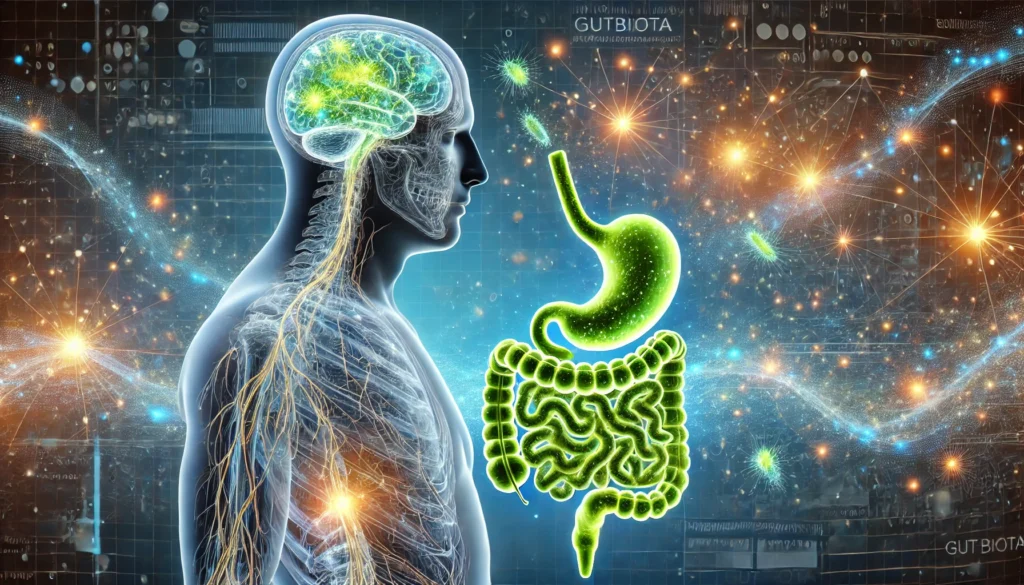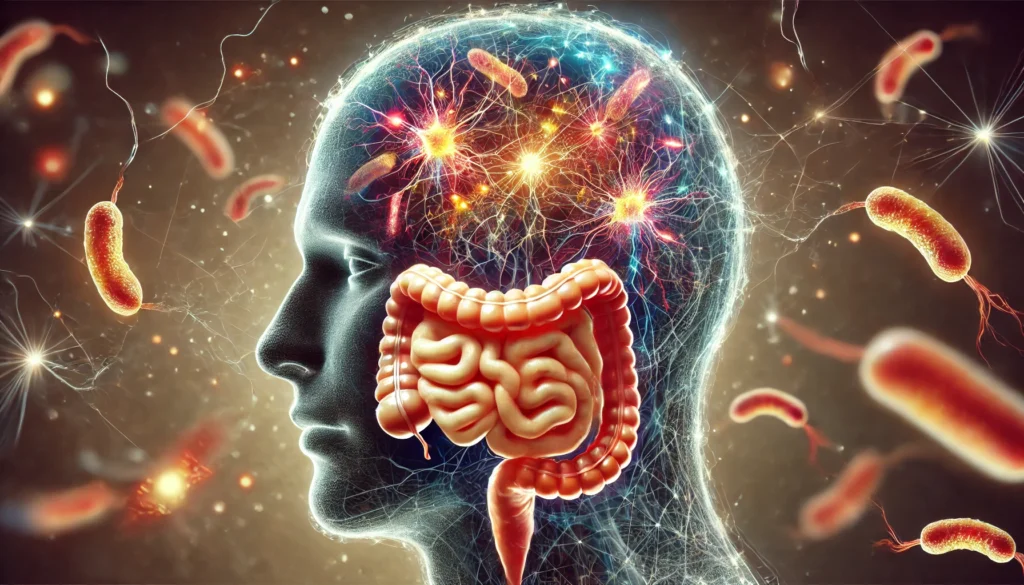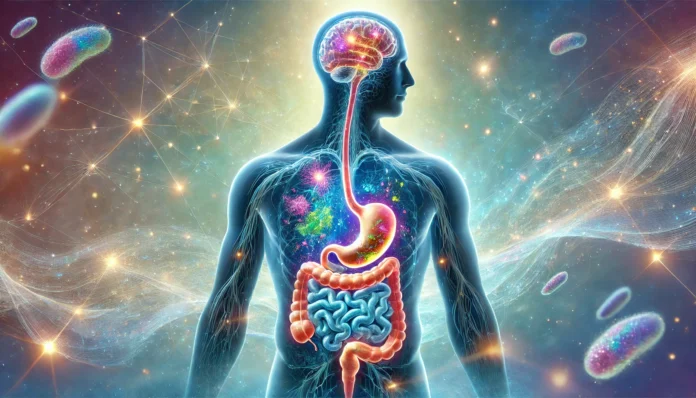Introduction
The intricate relationship between the human gut and brain has become an area of intense scientific investigation, leading to the growing recognition of the gut-brain axis as a critical component of overall health. The gastrointestinal tract is home to trillions of microorganisms, collectively referred to as gastrointestinal flora, which play a pivotal role in digestion, immune function, and even mental health. Researchers have uncovered compelling evidence suggesting that the state of one’s intestinal flora bacteria significantly influences cognitive function, mood regulation, and susceptibility to mental health disorders. Understanding how gut health affects the mind requires an exploration of the biological mechanisms linking bowel flora to neurological processes, the implications of dysbiosis on mental well-being, and strategies for fostering a healthier gut to support optimal cognitive and emotional functioning.
You may also like: How to Improve Gut Health Naturally: Science-Backed Tips for a Stronger Microbiome
The Gut-Brain Axis: A Complex Communication Network
The gut-brain axis is a bidirectional communication system that connects the gastrointestinal tract with the central nervous system. This connection is facilitated through neural, hormonal, and immunological pathways, ensuring constant dialogue between the gut and the brain. One of the primary channels of communication within this axis is the vagus nerve, which transmits signals from the gut to the brainstem and vice versa. Additionally, gut microbiota influence brain function by producing neurotransmitters such as serotonin, dopamine, and gamma-aminobutyric acid (GABA), which play critical roles in mood regulation and cognitive processes.
Disruptions in the balance of GI flora can lead to an overactivation of the body’s stress response, increasing inflammation and exacerbating conditions such as anxiety and depression. Studies have demonstrated that individuals with imbalances in intestinal flora bacteria often exhibit alterations in brain chemistry, contributing to changes in mood, behavior, and even cognitive decline. Understanding the interplay between gastrointestinal flora and brain function highlights the significance of gut health in maintaining psychological resilience and emotional stability.
The Role of Gastrointestinal Flora in Mental Health
Gastrointestinal flora comprises diverse species of bacteria, fungi, and viruses that coexist symbiotically within the digestive tract. These microorganisms play essential roles in nutrient metabolism, immune regulation, and the synthesis of bioactive compounds that influence brain function. Among the most crucial contributions of bowel flora to mental health is the production of short-chain fatty acids (SCFAs), which are metabolic byproducts of dietary fiber fermentation. SCFAs, such as butyrate, propionate, and acetate, serve as key modulators of neuroinflammation and neurotransmitter synthesis, thereby impacting mental well-being.
Another critical function of gut microbiota is their ability to modulate the hypothalamic-pituitary-adrenal (HPA) axis, which governs the body’s response to stress. Dysbiosis, or an imbalance in gut flora, has been associated with heightened HPA axis activity, leading to increased cortisol levels and a greater risk of anxiety and depression. Furthermore, specific strains of probiotics, such as Lactobacillus and Bifidobacterium, have been shown to exert anxiolytic and antidepressant-like effects by regulating inflammation and neurotransmitter production. The growing body of evidence supporting the gut-brain connection underscores the importance of maintaining a balanced and diverse GI flora to promote mental health.

How Diet Influences Gut Microbiota and Mental Well-Being
Diet plays a fundamental role in shaping the composition and functionality of gastrointestinal flora, with profound implications for mental health. A diet rich in fiber, prebiotics, and fermented foods fosters the growth of beneficial gut bacteria, while diets high in processed foods, sugar, and artificial additives contribute to dysbiosis and systemic inflammation. The Mediterranean diet, which emphasizes whole foods, healthy fats, and fermented products, has been associated with lower rates of depression and cognitive decline due to its positive impact on gut microbiota.
Prebiotics, found in foods such as garlic, onions, bananas, and asparagus, serve as fuel for beneficial bacteria, promoting their growth and metabolic activity. Probiotics, on the other hand, introduce live beneficial bacteria into the gut, reinforcing microbial diversity. Fermented foods such as yogurt, kefir, kimchi, and sauerkraut provide a natural source of probiotics, enhancing gut-brain communication and supporting mental well-being.
Conversely, diets high in refined carbohydrates and trans fats have been linked to increased gut permeability, also known as “leaky gut syndrome,” which can trigger systemic inflammation and contribute to neuropsychiatric disorders. By prioritizing gut-friendly dietary choices, individuals can cultivate a healthier GI flora, thereby improving their resilience to stress and enhancing cognitive function.
The Impact of Gut Dysbiosis on Cognitive Function and Mood Disorders
Gut dysbiosis, characterized by an imbalance in intestinal flora bacteria, has been implicated in various cognitive and mood disorders, including depression, anxiety, and neurodegenerative diseases. When harmful bacteria outnumber beneficial species, the resulting inflammatory response can disrupt neurotransmitter balance and impair cognitive function.
Several studies have demonstrated that individuals with major depressive disorder (MDD) exhibit alterations in their gut microbiota composition, often showing reduced levels of beneficial bacteria such as Lactobacillus and Bifidobacterium. Similarly, gut dysbiosis has been linked to neurodegenerative diseases like Alzheimer’s and Parkinson’s, where chronic inflammation and oxidative stress contribute to cognitive decline.
Addressing gut dysbiosis through dietary interventions, probiotics, and lifestyle modifications offers a promising avenue for mitigating the effects of mental health disorders. Research suggests that restoring a healthy gut microbiome can alleviate symptoms of depression and anxiety while enhancing cognitive function and emotional resilience.
Strategies for Enhancing Gut Health to Support Mental Well-Being
Adopting lifestyle and dietary habits that promote a healthy gut microbiome is essential for optimizing mental well-being. In addition to consuming a diverse, nutrient-rich diet, several strategies can help maintain a balanced GI flora:
- Regular Physical Activity: Exercise has been shown to enhance gut microbial diversity and promote the growth of beneficial bacteria, leading to improved mood and cognitive function.
- Stress Management: Chronic stress negatively impacts gut health by altering microbiota composition and increasing intestinal permeability. Mindfulness practices, yoga, and meditation can help mitigate stress-related disruptions in gut flora.
- Adequate Sleep: Poor sleep quality is associated with gut dysbiosis and increased inflammation, which can contribute to mood disorders. Prioritizing sleep hygiene and maintaining a consistent sleep schedule supports a healthier gut-brain axis.
- Avoiding Overuse of Antibiotics: While antibiotics are sometimes necessary, their overuse can deplete beneficial gut bacteria and contribute to microbial imbalances. Using antibiotics judiciously and incorporating probiotics post-treatment can help restore gut health.
By implementing these strategies, individuals can foster a robust and diverse gut microbiome, supporting both physical and mental well-being.

Frequently Asked Questions: The Link Between Gastrointestinal Flora and Mental Well-Being
1. How does gastrointestinal flora influence neurotransmitter production?
Gastrointestinal flora plays a crucial role in the synthesis and regulation of neurotransmitters that impact mental well-being. Certain species of intestinal flora bacteria are responsible for producing neurotransmitters such as serotonin, dopamine, and gamma-aminobutyric acid (GABA), all of which regulate mood and cognitive function. Approximately 90% of serotonin, a key neurotransmitter linked to happiness and emotional stability, is synthesized in the gut by specialized enterochromaffin cells influenced by GI flora. Additionally, beneficial gut bacteria can enhance the bioavailability of tryptophan, the amino acid precursor to serotonin, ensuring a stable production of this mood-regulating chemical. Disruptions in bowel flora can lead to neurotransmitter imbalances, increasing susceptibility to conditions like depression and anxiety.
2. Can gut dysbiosis contribute to cognitive impairment?
Yes, an imbalance in gastrointestinal flora can have significant consequences on cognitive function, leading to issues such as brain fog, memory lapses, and reduced mental clarity. Gut dysbiosis triggers chronic inflammation, which can disrupt the blood-brain barrier, allowing inflammatory cytokines to enter the brain and impair neuronal communication. Studies have shown that individuals with compromised bowel flora often exhibit reduced levels of short-chain fatty acids, which are essential for neuronal health and cognitive resilience. Moreover, gut inflammation resulting from an overgrowth of harmful bacteria can accelerate oxidative stress, contributing to neurodegenerative diseases such as Alzheimer’s and Parkinson’s. Maintaining a balanced gut microbiome through diet, probiotics, and lifestyle modifications can help support cognitive longevity and mental sharpness.
3. How does stress affect gut microbiota and mental health?
Chronic stress has a profound impact on gastrointestinal flora, leading to microbial imbalances that affect mental health. When the body experiences stress, the hypothalamic-pituitary-adrenal (HPA) axis is activated, increasing cortisol levels, which can negatively alter GI flora composition. High cortisol levels reduce the abundance of beneficial intestinal flora bacteria, such as Lactobacillus and Bifidobacterium, while promoting the growth of harmful species that exacerbate inflammation and gut permeability. This gut imbalance can trigger systemic inflammation, negatively affecting mood and increasing the risk of anxiety and depression. Stress management techniques such as mindfulness meditation, deep breathing, and regular exercise can help maintain a healthy gut-brain connection.
4. What role do probiotics and prebiotics play in maintaining mental well-being?
Probiotics and prebiotics are essential in promoting a diverse and healthy GI flora, which in turn supports mental well-being. Probiotics are live beneficial bacteria that help restore balance in the gut microbiome, improving digestion, immune function, and neurotransmitter production. Common probiotic-rich foods include yogurt, kefir, miso, and sauerkraut. Prebiotics, on the other hand, are non-digestible fibers that serve as food for beneficial bowel flora, fostering their growth and metabolic activity. Foods like garlic, onions, bananas, and asparagus are excellent sources of prebiotics. Together, these gut-supporting nutrients help regulate inflammation, maintain intestinal barrier integrity, and enhance the production of mood-stabilizing compounds.
5. How do antibiotics affect the gut-brain connection?
Antibiotics, while essential for treating bacterial infections, can significantly disrupt gastrointestinal flora, potentially leading to negative effects on mental health. Broad-spectrum antibiotics do not discriminate between harmful and beneficial bacteria, often depleting vital intestinal flora bacteria that contribute to neurotransmitter synthesis and immune function. This disruption can result in digestive issues, weakened immunity, and even mood disorders such as depression and anxiety. Some studies suggest that post-antibiotic gut dysbiosis can persist for months or even years if not properly addressed. To mitigate these effects, individuals should consider taking probiotics during and after antibiotic treatment, as well as consuming fiber-rich foods to support microbial repopulation.
6. Can an unhealthy diet contribute to mood disorders through gut health?
Yes, an unhealthy diet can negatively impact gastrointestinal flora, increasing the risk of mood disorders. Diets high in processed foods, artificial additives, and refined sugars promote the growth of harmful gut bacteria while reducing microbial diversity. This imbalance can lead to increased gut permeability, also known as “leaky gut,” allowing inflammatory substances to enter the bloodstream and affect brain function. Additionally, an unhealthy diet deprives beneficial bowel flora of essential nutrients needed to produce mood-stabilizing compounds. Switching to a gut-friendly diet rich in whole foods, healthy fats, and fermented products can improve microbial diversity and support emotional resilience.
7. What is the impact of sleep on gut microbiota and mental well-being?
Sleep plays a fundamental role in maintaining a balanced GI flora, which in turn influences mental well-being. Poor sleep disrupts the circadian rhythms that regulate microbial activity, leading to a reduction in beneficial intestinal flora bacteria and an increase in harmful species. Sleep deprivation has also been linked to heightened inflammation, which can negatively affect mood and cognitive function. Moreover, an imbalance in bowel flora may contribute to sleep disturbances by altering the production of sleep-regulating neurotransmitters such as melatonin. Prioritizing sleep hygiene through consistent bedtime routines, reduced screen exposure, and relaxation techniques can support both gut health and mental clarity.
8. How does exercise benefit gut health and mental function?
Regular exercise has been shown to positively impact gastrointestinal flora by increasing microbial diversity and enhancing the production of short-chain fatty acids that support brain function. Physical activity promotes the growth of beneficial bacteria while reducing inflammation, which is crucial for maintaining a balanced gut-brain connection. Additionally, exercise stimulates the release of brain-derived neurotrophic factor (BDNF), a protein essential for cognitive function and emotional resilience. Research suggests that individuals who engage in regular physical activity have a lower risk of depression, anxiety, and cognitive decline. Incorporating aerobic exercise, strength training, and movement-based activities like yoga can significantly benefit both gut microbiota and overall mental health.
9. Can gut health influence social behavior and emotional regulation?
Emerging research suggests that gastrointestinal flora can shape social behavior and emotional regulation by influencing neurochemical pathways. Certain strains of intestinal flora bacteria play a role in modulating oxytocin levels, a hormone that promotes social bonding and emotional stability. Studies have found that individuals with gut dysbiosis may experience increased social withdrawal, heightened stress responses, and difficulty processing emotions. Furthermore, gut bacteria contribute to the production of GABA, a neurotransmitter that calms the nervous system and reduces social anxiety. By maintaining a balanced GI flora through diet, probiotics, and lifestyle choices, individuals may experience improved social engagement and emotional well-being.
10. What future developments in gut-brain research could change mental health treatments?
The future of gut-brain research holds exciting possibilities for revolutionizing mental health treatments. Scientists are exploring the potential of personalized probiotics tailored to an individual’s microbiome to address specific psychiatric disorders. Advances in microbiome sequencing technology may allow for more precise diagnoses of gut imbalances contributing to mental health conditions. Additionally, fecal microbiota transplants (FMT) are being investigated as a novel therapy for restoring GI flora in patients with severe dysbiosis-related mental health disorders. Researchers are also studying the role of psychobiotics, a class of probiotics specifically designed to enhance cognitive function and emotional resilience. As our understanding of the gut-brain connection deepens, future treatments may integrate gut microbiota-based interventions alongside traditional psychiatric therapies.

Conclusion
The relationship between gut health and mental well-being is an evolving area of scientific inquiry with profound implications for understanding and treating psychological disorders. The presence and balance of gastrointestinal flora play a critical role in regulating mood, cognition, and stress response, highlighting the importance of gut microbiota in overall health. Addressing gut dysbiosis through dietary interventions, probiotics, and lifestyle modifications offers a promising avenue for enhancing mental resilience and cognitive function. By recognizing the vital connection between gut and brain health, individuals can take proactive steps to cultivate a thriving gut microbiome, ultimately supporting emotional and cognitive well-being for years to come.
gut microbiome and mental health, gut-brain axis connection, impact of gut bacteria on mood, microbiome and anxiety, probiotics for mental clarity, gut health and depression, diet and brain function, intestinal microbiota balance, gut flora and stress response, healthy gut for emotional well-being, neurotransmitters and gut bacteria, digestive health and cognition, role of prebiotics in mental health, fermented foods for brain health, microbiome diversity and mental resilience, gut inflammation and cognitive decline, HPA axis and gut microbiota, serotonin production in the gut, lifestyle habits for gut health, mental well-being through nutrition
Further Reading:
The Connection Between Gut Health and Mental Well-Being
The Gut-Brain Connection: How Gut Health Impacts Mental Well-being
Gut microbiota’s effect on mental health: The gut-brain axis
Disclaimer
The information contained in this article is provided for general informational purposes only and is not intended to serve as medical, legal, or professional advice. While Health11News strives to present accurate, up-to-date, and reliable content, no warranty or guarantee, expressed or implied, is made regarding the completeness, accuracy, or adequacy of the information provided. Readers are strongly advised to seek the guidance of a qualified healthcare provider or other relevant professionals before acting on any information contained in this article. Health11News, its authors, editors, and contributors expressly disclaim any liability for any damages, losses, or consequences arising directly or indirectly from the use, interpretation, or reliance on any information presented herein. The views and opinions expressed in this article are those of the author(s) and do not necessarily reflect the official policies or positions of Health11News.


